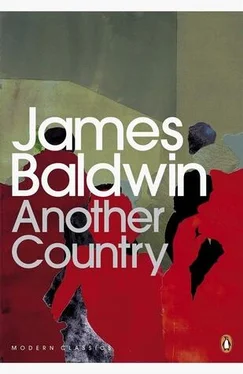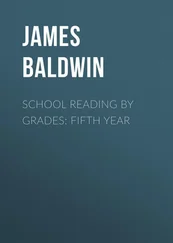There was a high, driving wind which brightened the eyes and the faces of the people and forced their lips slightly apart, so that they all seemed to be carrying, to some immense encounter, the bright, fragile bubble of a lifetime of expectation. Bright boys in windbreakers, some of them with girls whose hair, whose fingertips, caught the light, looked into polished delicatessen windows, the windows of shops, paused at the entrances of movie theatres to look at the gleaming stills; and their voices, which shared the harsh quality of the light which covered them, seemed breaking on the air like glass splinters.
Children, in great gangs and clouds, erupted out of side streets with the sound of roller skates and came roaring down on their elders like vengeance long prepared, or the arrow released from the bow.
“I’ve never seen such a day,” he said to Ida, and it was true. Everything seemed to be swollen, thrusting and shifting and changing, about to burst into music or into flame or revelation.
Ida said nothing. He felt, rather then saw her smile, and he was delighted all over again by her beauty. It was as though she were wearing it especially for him. She was more friendly with him today than she had ever been. He did not feel today, as he had felt for so long, that she was evading him, locking herself away from him, forcing him to remain a stranger in her life. Today she was gayer and more natural, as though she had at last decided to come out of mourning. There was in her aspect the flavor of something won, the atmosphere of hard decisions past. She had come up from the valley.
She moved with a wonderful, long-legged stride and she carried her head high, as though it had borne, but only yesterday, the weight of an African water jar. Her mother’s head had borne the weight of white folk’s washing, and it was because Ida had never known what to make of this fact — should she be ashamed of it, or proud? — that there mingled in her regal beauty something of the too-quick, diffident, plebeian disdain. She was working now as a waitress in a chain restaurant on the eastern edge of the Village and her confusion revealed itself in her attitude toward her customers, an attitude which was at once haughty and free. He had often watched her as she crossed the floor in her checkered apron, her face a dark mask behind which belligerence battled with humility. This was in her eyes which never for an instant lost their wariness and which were always ready, within a split second, to turn black and lightless with contempt. Even when she was being friendly there was something in her manner, in her voice, which carried a warning; she was always waiting for the veiled insult or the lewd suggestion. And she had good reason for it, she was not being fantastical or perverse. It was the way the world treated girls with bad reputations and every colored girl had been born with one.
Now, as she walked beside him, trim and oddly elegant in a heavy, dark blue coat, and with her head covered by an old-fashioned and rather theatrical shawl, he saw that both her vanity and her contempt were being swollen by the glances which rested on her as briefly and unforgettably as the touch of a whip. She was very, very dark, she was beautiful; and he was proud to be with her, artlessly proud, in the shining, overt, male way; but the eyes they passed accused him, enviously, of a sniggering, back-alley conquest. White men looked at her, then looked at him. They looked at her as though she were no better, though more lascivious and rare, than a whore. And then the eyes of the men sought his, inviting a wet complicity.
The women, too. They saw Ida first and might have been happy to admire her if she had been walking alone. But she was with Vivaldo, which gave her the status of a thief. The means that she had used to accomplish this abduction were beneath or perhaps beyond them, but their eyes briefly accused Vivaldo of betrayal, then narrowed against a dream or a nightmare, and turned away.
Ida strode past, seeming not to see them. She conveyed with this stride and her bright, noncommittal face how far she felt them to be beneath her. She had the great advantage of being extraordinary — however she might bear this distinction, or however others might wish to deny it; whereas, her smile suggested, these people, the citizens of the world’s most bewildered city, were so common that they were all but invisible. Nothing was simpler for her than to ignore, or to seem to ignore, these people: nothing was farther beyond them than the possibility of ignoring her. And the disadvantage at which they thus were placed, for which, after all, they had only themselves to blame, said something which Vivaldo could scarcely believe concerning the poverty of their lives.
So their passage raised small clouds of male and female hostility which blew into their faces like dust. And Ida accepted this spiteful tribute with a spiteful pride.
“What are you humming?” he asked. She had been humming to herself for a block or so.
She continued humming for another second, coming to the end of a phrase. Then she said, smiling. “You wouldn’t know it. It’s an old church song. I woke up with it this morning and it’s been with me all day.”
“What is it?” he asked. “Won’t you sing it for me?”
“You not about to get religion, are you?” She looked at him sideways, grinning. “I used to have religion, did you know that? A long time ago, when I was a little girl.”
“No,” he said, “there’s a whole lot about you I don’t know. Sing your song.”
She bent her head toward him, leaning more heavily on his arm, as though they were two children. The colors of the shawl flashed.
She sang, in her low, slightly rough voice, whispering the words to him:
I woke up this morning with my mind
Stayed on Jesus.
I woke up this morning with my mind
Stayed on Jesus.
“That’s a great way to wake up,” he said.
And she continued:
I stayed all day with my mind
Stayed on Jesus.
Hallelu, Hallelu
Hallelujah!
“That’s a great song,” he said. “That’s tremendous. You’ve got a wonderful voice, you know that?”
“I just woke up with it — and it made me feel, I don’t know — different than I’ve felt for months. It was just as though a burden had been taken off me.”
“You still do have religion,” he said.
“You know, I think I do? It’s funny, I haven’t thought of church or any of that type stuff for years. But it’s still there, I guess.” She smiled and sighed. “Nothing ever goes away.” And then she smiled again, looking into his eyes. This shy, confiding smile made his heart move up until it hung like a Ferris wheel at its zenith, looking down at the fair. “It seems to go away,” she said in a wondering tone, “but it doesn’t, it all comes back.” And his heart plunged; he watched her face, framed by the brilliant shawl. “I guess it’s true, what they used to tell me — if you can get through the worst, you’ll see the best.”
They turned off the Avenue, toward Cass’ house.
“What a beautiful girl you are,” he said. She turned from him, irrepressibly humming her song. “You are, you know.”
“Well,” she said, and turned toward him again, “I don’t know if I’m beautiful or not. But I know you’re crazy.”
“I’m crazy about you . I hope you know that .”
He said it lightly and did not know if he should curse himself for his cowardice or congratulate himself on his restraint.
“I don’t know what I’d have done without you,” she said, “these last few months. I know I didn’t see much of you, but I knew you were there, I felt it, and it helped — oh, more than I’ll ever be able to tell you.”
Читать дальше












